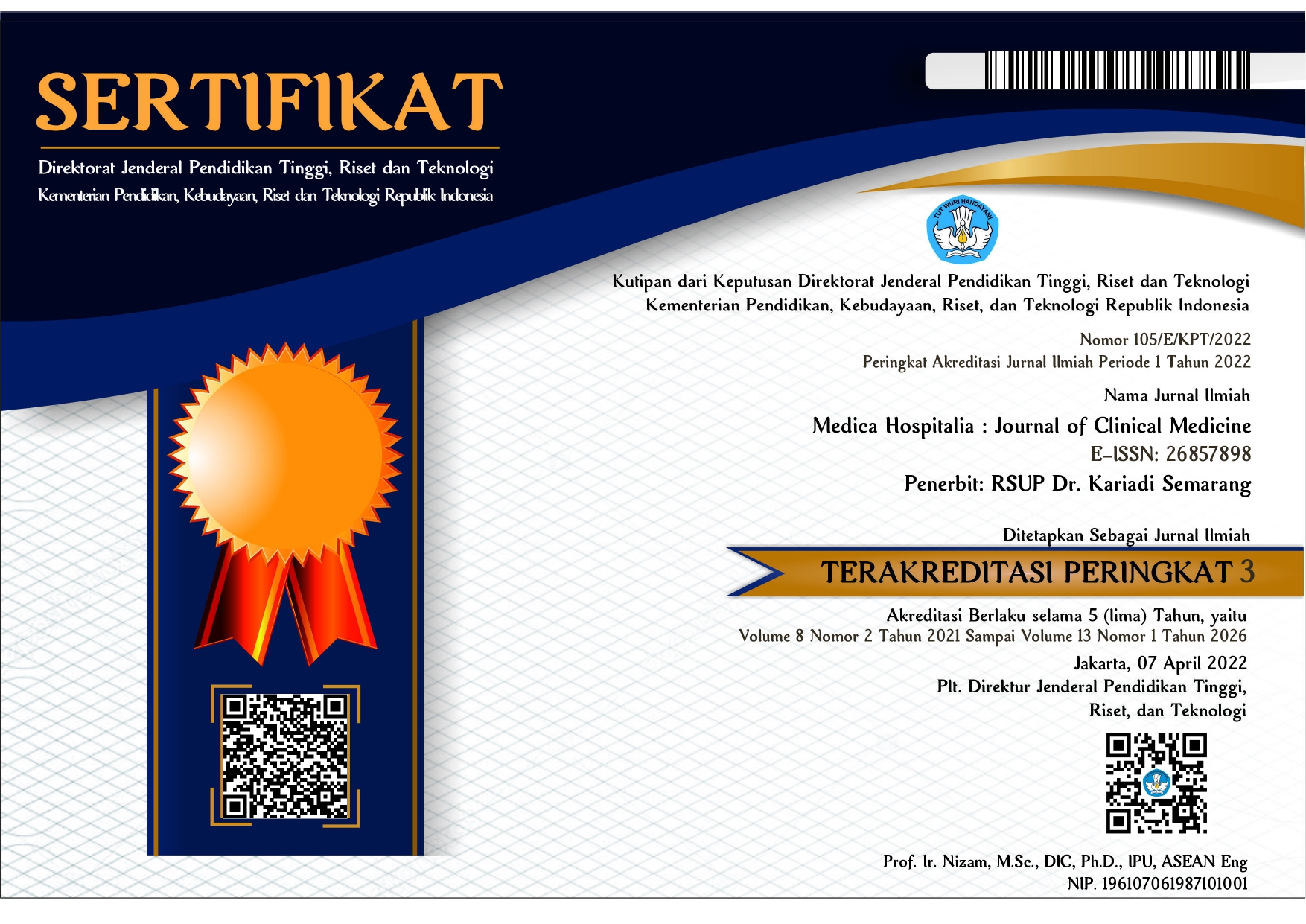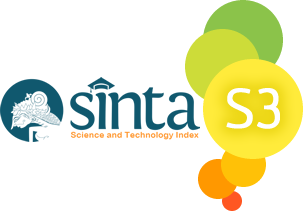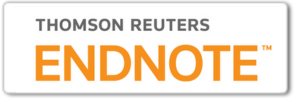Etiologi Dan Patofisiologi Kasus Intractable Hiccups Pada Pasien Laki-Laki 57 Tahun
DOI:
https://doi.org/10.36408/mhjcm.v8i3.676Keywords:
Intractable HiccupsAbstract
Latar belakang : Hiccup adalah hembusan napas yang mengacu dari suara yang dihasilkan kontraksi diafragma dan otot intercostal secara tidak sadar dan mendadak dilanjutkan dengan kontraksi mendadak dari glotis. Hiccup merupakan gejala yang biasa dikenal setiap orang namun tetap merupakan gejala patologis.
Laporan kasus : Dilaporkan laki laki usia 57 tahun dengan cegukan sejak 1 tahun. Pemeriksaan laringoskopi fleksibel menunjukkan adanya LPR (RFS 15). Pasien didiagnosis LPR dan intractable hiccup ec susp gangguan sentral (CNS), diagnosis banding psikogenik. Pasien diberikan terapi metochlopramid dan chlorpromazine selama 5 hari. Hasil evaluasi pasien mengeluh cegukan tidak berkurang. Pasien lalu diberikan terapi omeprazole 20 mg per 12 jam.
Pembahasan : Persistent dan intractable hiccup merupakan gejala yang sulit diobati, bila penyebab diketahui maka diobati sesuai penyebabnya, namun bila penyebab tidak diketahui terapi empiris dilakukan untuk menekan GERD sehingga gejala hiccup perbaikan. Apabila terapi ini gagal agen farmakologi ditujukan ke reseptor dopaminergik dan GABA-ergik.
Kesimpulan : Penatalaksanaan hiccup perlu diketahui etiologi terutama gangguan LPR, GERD dan CNS hingga perlu penanganan multidisipliner dari bagian THT, interna, neurologi dan psikiatri.
Downloads
References
2. Moretto EN, Wee B, Wiffen PJ, Murchison AG. Interventions for treating persistent and intractable hiccups in adults. The Cochrane Library. 2013(1):1-19.
3. Steger M, Schneemann M, Fox M. Systemic review: the pathogenesis and pharmacological treatment of hiccups. Alimentary Pharmacology and Therapeutics. 2015;42:1037–50.
4. Rizzo C, Vitale C, Montagnini M. Management of intractable hiccups: An illustrative case and review. American Journal of Hospice & Palliative Medicine. 2014;31(2):220-4.
5. J C. Chronic hiccup In: A B, editor. Orphanet Encyclopedia. France2004. p. 1-2.
6. Koçkar C, ??ler M, Cüre E, ?enol A, Ba?türk A. Hiccup due to gastroesophageal reflux disease. European Journal of General Medicine. 2009;6(4):262-4.
7. Nardone V, Vinciguerra C, Tini P, Rocchi R, Pirtoli L. Persistent hiccup after chemo-radiotherapy in nasopharyngeal cancer: an atypical side effect? Acta Neurol Belg. 2016:1-3.
8. Lee GW, Oh SY, Kang MH, Kang JH, Park SH, Hwang IG, et al. Treatment of dexamethasone-induced hiccup in chemotherapy patients by methylprednisolone rotation. The Oncologist Express. 2013;18:1229–34.
9. Callejoa FJG, Martíneza JR, Carbonella TP, Gandíab RM, Beneytoae MPM, Piedrahita IR. Hiccups. Attitude in otorhinolaryngology towards consulting patients. A diagnosticand therapeutic approach. Acta Otorrinolaringol Esp 2016:1-8.
10. Wang TG, Wang D. Metoclopramide for patients with intractable hiccups: A multi-center, randomized, controlled pilot study. Intern Med J 2014;44:1205–9.
Additional Files
Published
How to Cite
Issue
Section
Citation Check
License
Copyright (c) 2021 Medica Hospitalia : Journal of Clinical Medicine

This work is licensed under a Creative Commons Attribution-ShareAlike 4.0 International License.
Copyrights Notice
Copyrights:
Researchers publishing manuscrips at Medica Hospitalis: Journal of Clinical Medicine agree with regulations as follow:
Copyrights of each article belong to researchers, and it is likewise the patent rights
Researchers admit that Medica Hospitalia: Journal of Clinical Medicine has the right of first publication
Researchers may submit manuscripts separately, manage non exclusive distribution of published manuscripts into other versions (such as: being sent to researchers’ institutional repository, publication in the books, etc), admitting that manuscripts have been firstly published at Medica Hospitalia: Journal of Clinical Medicine
License:
Medica Hospitalia: Journal of Clinical Medicine is disseminated based on provisions of Creative Common Attribution-Share Alike 4.0 Internasional It allows individuals to duplicate and disseminate manuscripts in any formats, to alter, compose and make derivatives of manuscripts for any purpose. You are not allowed to use manuscripts for commercial purposes. You should properly acknowledge, reference links, and state that alterations have been made. You can do so in proper ways, but it does not hint that the licensors support you or your usage.

























